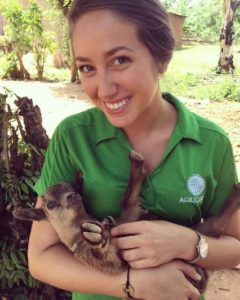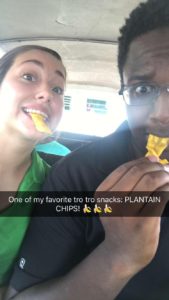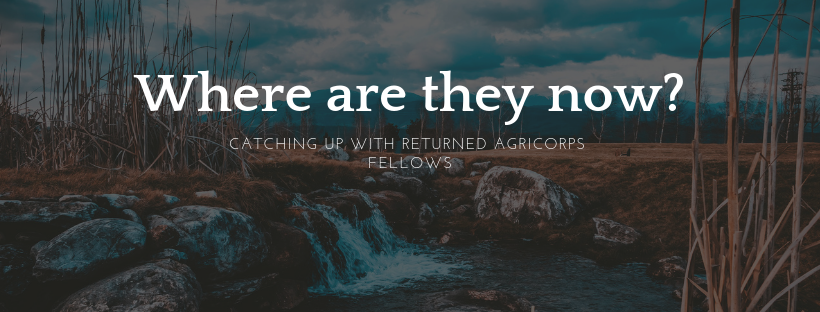Returned AgriCorps Fellow: Carrie Stephens
Class: 4 (2017-2018)
Placement: Akwane Dobro Presbyterian JHS, Eastern Region, Ghana
 What are you up to now? Tell us about your day-to-day duties.
What are you up to now? Tell us about your day-to-day duties.
I live in Arizona where I work as a Companion Animal Sales Representative. Each day looks different, but most days I spend visiting veterinary clinics discussing various disease states that impact our pets and potential treatment options and protocols. My job allows me to continually educate myself and others on the changing climate of animal health, which I find fun and fascinating! I spend time building relationships and getting to know my clinics in order to better understand their needs and how we can provide solutions. I genuinely enjoy getting to meet so many different people and learning why they do what they do. Veterinarians and veterinary staff are truly amazing people and they work so hard to keep our pets safe, happy, and healthy. I greatly enjoy being a resource for them and learning from them. I also get to work trade shows and have the opportunity to learn from other veterinarians and their staff from all over the world! It really never gets boring. During the midst of COVID I am currently trying to make sure we have the knowledge we need to better partner and create effective presentations and learning resources for each clinic.
How did your time as an AgriCorps Fellow influence your career?
Being an AgriCorps Fellow was challenging in multiple ways that have all influenced my career and my day to day work. First, my understanding of international agriculture is much deeper and I have better context for the products and programs we initiate within the global animal health industry. Second, throughout my time as an AgriCorps Fellow, I was a teacher at a junior high school and being a teacher gave me experiences that have further aided in my ability to lead effective and engaging education sessions with the clinics I work with. Teaching with limited resources in my classroom in Ghana helped me develop transferable skills of innovation and creativity to design interactive presentations where I don’t always have to rely on technology. When you are working in veterinary clinics, being adaptable and flexible goes a long way. Overall, my experience will AgriCorps made me more aware that our intentions and the outcomes are not always aligned. We can have great intentions for a project, but if we do not have buy-in, input, and participation from the stakeholders, it will most likely fail.
How did your time as an AgriCorps Fellow influence your opinion on international development?
Before I even became a Fellow, it was very clear that the fellowship program was not meant for Americans without any agricultural skills to go and teach farmers in West Africa how to farm. Unlike a lot of other organizations, there was a clear precedent of required background knowledge while balancing that with the belief that we didn’t have all the answers. There was so much that I learned and was humbled by through my experience living in Ghana. I have a new context for what international development means in the big picture and the different implications and impacts it has on communities and countries. I now know that in many cases the western world’s attempts at “bettering” other countries has actually caused a lot of harm, and further perpetuated a savior complex and the perspective that impoverished communities are helpless and passive victims of their circumstances. When discussing and implementing programs, having the humility and the wisdom to come into the project knowing you do not have the answers and choosing to listen and learn first are imperative. Programs such as AgriCorps work with existing organizations and people on-the ground in order to make sure that the impacts are sustainable and last long after we are gone. I learned through my experience that school-based agricultural education is integral for adoption of best practices and youth empowerment. A few of my students would take information we learned from 4-H and bring it back to their family farms. Once their parents saw results from the practices implemented, they were much more likely to adopt those practices, as well. This early adoption and dissemination are what create personal and community engagement and involvement and lead to sustainable growth and development.
What was most memorable to you about your experiences in West Africa/AgriCorps?
I really have too many memories to count: the LEAD (Leadership, Education, Agriculture, and Develop) workshops we were able to facilitate throughout our different communities, the teacher training workshops, and the 4-H activities were all amazing. Getting to learn about No-Till Agriculture and watch my co-teacher, Wadie’s, face when he got to drive a John Deer tractor for the first time, makes me smile even to this day. But what was truly the most memorable were the people. The AgriCorps Fellows and my memories with them are some of my most fond memories of my entire life. From the first time we all met each other to now, they are all truly amazing people and I have learned so much from their tenacity, kindness, humility, friendship, and love. The friends I made in Ghana; Eunice, Kersia, Marc, and others, greatly impacted my experience and I have been able to maintain relationships with them. I was even able to go back and visit this year, which made me very happy! Sometimes the little things fade, but the relationships last a lifetime.

What was your favorite food in Ghana?
FuFu with Palm Nut soup was my favorite meal and plantain chips were my favorite snack.
What was your favorite place you visited in Ghana?
Wli Falls was breathtaking and one of the most beautiful places I have ever seen!


